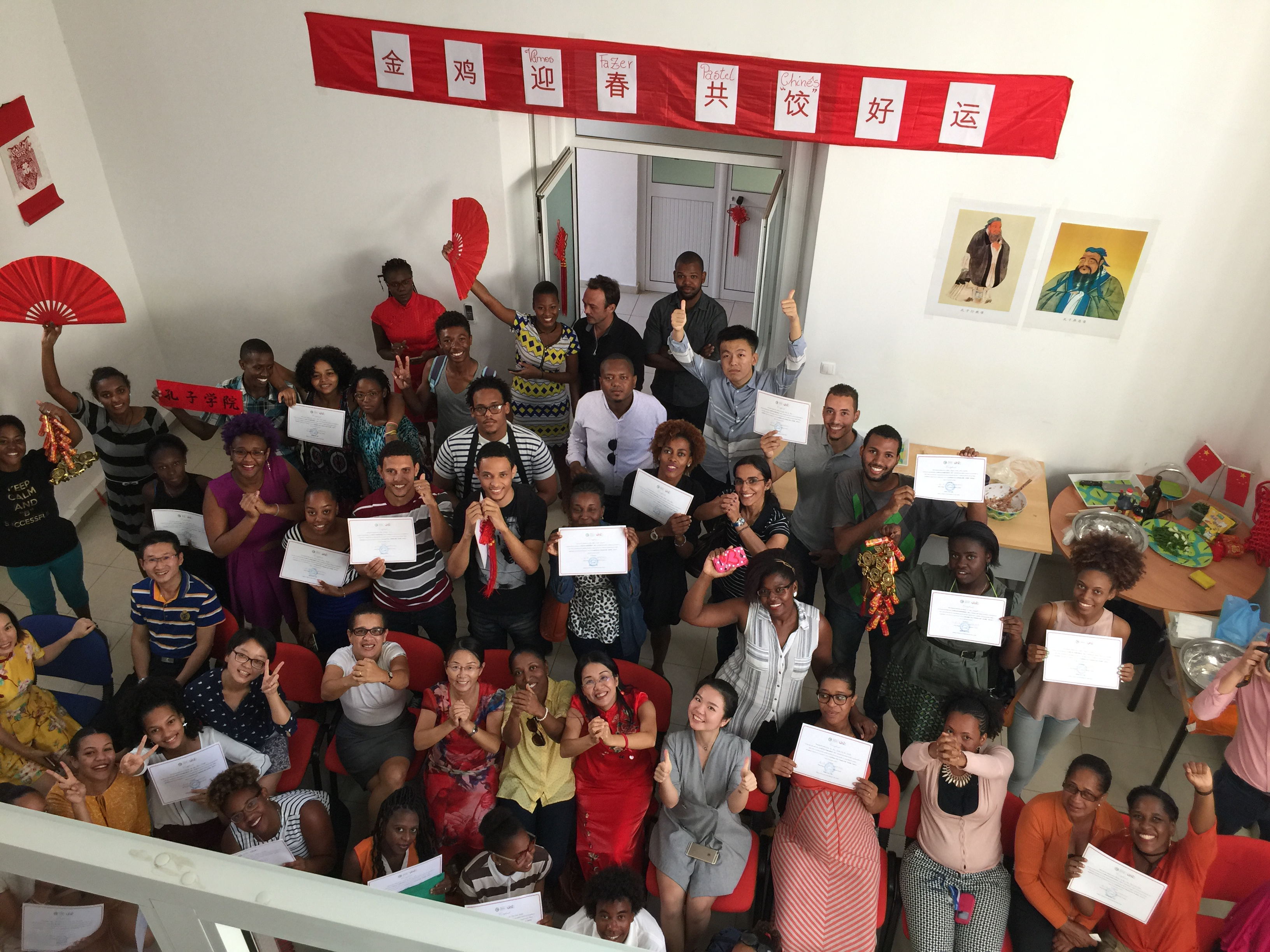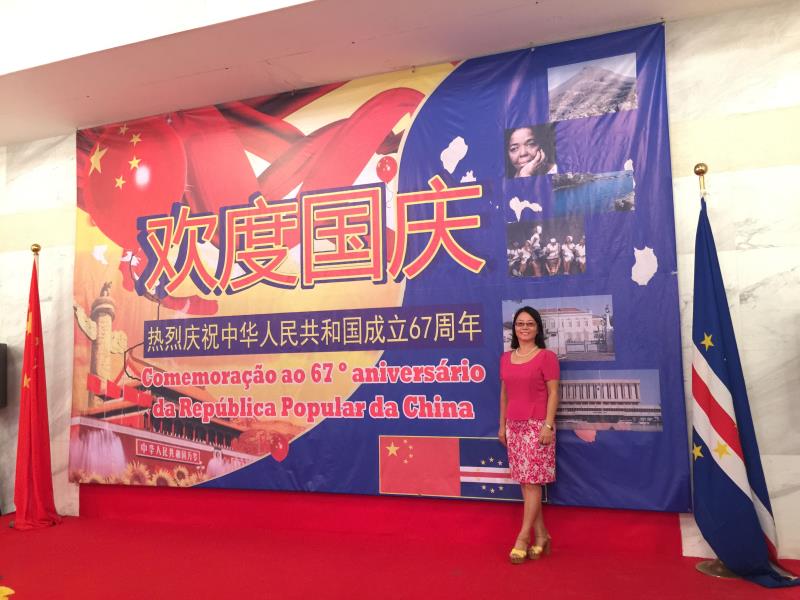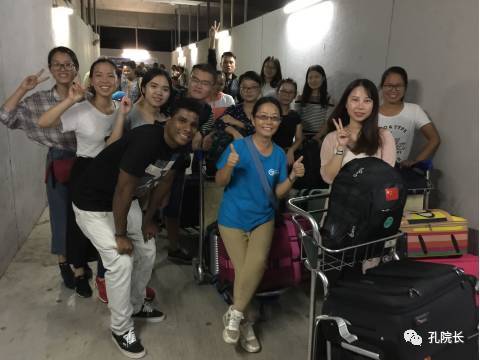Editor: The report series named “Female Envoys of Chinese Culture” are carried out by the Press Association to commemorate this year’s International Women’s Day, featuring three female scholars of GDUFS who just returned last semester from the university’s overseas Confucius Institutes. In the series, ZHENG Qingqun, CHEN Hui and YU Liuyi will tell us their encouraging and inspiring stories in three different countries about how they have disseminated the cream of Chinese culture and contributed to the amiable relations between China and other civilizations – despite culture shock and other barriers.
Under the auspices of some related officials at GDUFS, the Press was fortunate enough to have the chance to meet Professor ZHENG Qingjun, the former Chinese dean of the Confucius Institute at the University of Cape Verde. Petite, ZHENG looked chic with her shoulder-length hair and fashionable wardrobe. During the two-hour talk, her logical, clear and humorous speech infused the whole office with giggles and laughter. When it came to her experience as the first Chinese dean of the newly established institute in the faraway land, she first of all expressed her sincere gratitude for the joint efforts of all the participants, “I was so indebted to my teammates and working partners; also to GDUFS, the Cape Verde Embassy and the University of Cape Verde. All the credits should be owed to the whole group, not just me”.

Engaging cultural experience of the 2017 Chinese New Year at the Institute
From ground zero to school opening in 38 days
The festive inauguration ceremony of the Confucius Institute kicked off on January 18th 2016 and arrested a large crowd, but few of them had any idea that 38 days ago the place where they entered was merely an empty building.
Over a month before, ZHENG, together with three volunteers, arrived at the Institute with high expectations but quickly suffered a hard blow by the harsh reality – the decoration was only done halfway; there were no proper candidates for secretaries or shelters for the Chinese teaching staff. With the belief that the Institute should have been opened on time, ZHENG rolled up her sleeves and started working on the program right on the spot with her companions without much deliberation or resentment. From purchasing necessities to finding dormitories, they managed to get everything geared up by and by before the opening day. Steeped in her memory lane, ZHENG jubilantly mentioned a “versatile” Ping-Pong table, “it has multiple uses – table tennis playing, booking reading, tea serving, staff meeting and calligraphy practicing”.

ZHENG at a celebrating event for PRC’s 67th birthday
Six talks and seven revisions traded for an essential role of Chinese teaching in local educational system
Cape Verde, an island nation in the Atlantic Ocean off the northwestern coast of Africa, is inhabited by only around 500,000 people which are scattered across 10 different small islands. As the program unfolded, the biggest challenge was writ large, that is, how to ensure the sustainable development of education. Fortunately, since the incumbent government had been looking forward to more exchanges with China, under the support of the local Chinese embassy, ZHENG made her way to the local education authorities six times and signed up for a cooperation agreement in May 2017, which had been revised seven times. The treaty, focusing on exchanging Chinese culture into the country’s middle school, has undoubtedly offered a brand new opportunity for local Chinese studies.
Desirable effects could not be fully explained without ZHENG’s all-out input. With a firm belief in the role of culture, by 2016, ZHENG had held or co-organized up to 55 activities of all sorts featured by Chinese culture, winning a good repute for the Institute from the sectors of culture, education and foreign affairs in the country. Though priority was then shifted to teaching, still 25 cultural events were conducted in the course of 2017. The beginning two years had witnessed the Institute’s thriving development. In terms of registration, a total of 1636 students matriculated in 2017: four times the scale of the previous year.
the Confucius Institute signed up a cooperation agreement with the local ministry of education
Every day from six a.m. to twelve a.m.
“6 a.m. in Cape Verde is 3 p.m. in China. Assignments from China tended to be quite urgent; for instance, they needed to be dealt with on that day. So if I didn’t hurry up I couldn’t submit the materials during the offices hours in Beijing time. I wouldn’t dare wake up late”, ZHENG told the Press. Up at 6, ZHENG would first finish tasks from China and at around 9, she would go to the Institute around 7 km away by the bus that “resembled the Chinese one in the 1980s”. During the day, she might negotiate with all kinds of institutions over some cultural and teaching activities. To give full play to her own expertise in Chinese teaching, ZHENG had a related course herself apart from the administration work. “It was fine I didn’t have time for daytime classes. I just chose to impart what I was good at at night then,” she said.
The dean was not so generous with her time for her private life. “I would fill my stomach with loads of food at noon, and then I would not be too starved at night. In doing this, a dinner’s time was saved”. As regards accommodation, it’s stipulated that people at her position can a rent of 80 square metres, but ZHANG bore with her 50-square-metre room all along because she couldn’t afford the time to find herself a decent one. When her husband came to visit her all the way from China, the man could only do with a bed on the floor.

ZHENG received the third batch of volunteers at the airport
“ZHENG Mama” for the working staff
The motherly benevolence of ZHENG earned her great relationships with all the working staff there.
Though Cape Verde boasts an agreeable climate, the nation is surely lacking in vegetables and fruits, most of which need to be imported. And the absence of Chinese restaurants also poses a challenge for the Chinese foreigners. Under such circumstances, Zhang utilized all means to make all the Chinese staff feel at ease and helped them go through all possible difficulties. Any member of the Confucius Institute had a small birthday gathering to celebrate, served with a bought cake and several Chinese dishes made by herself. ZHENG’s secretary once commented ZHENG, “She is more than a director; she is a mother, almost to everyone”, and as a result, everyone there, including another dean who was over 40, called the female dean “ZHENG Mama”.
SU Chun, ZHENG’s colleague back in Cape Verde, showed her great thankfulness to the dedicated and beloved professor, “The more we know about ZHENG, the more reverence we feel like showing for her, but also our concerns for her health. Many thanks for her hard work!”

A jolly meal shared by ZHENG and the volunteers
